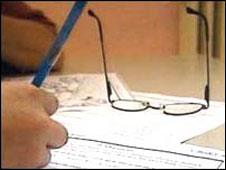University complaints on the rise
- Published

Universities face an increasing number of complaints
Student complaints against universities in England and Wales have almost doubled in five years, figures show.
The annual report from the Office for the Independent Adjudicator shows 1,007 complaints were lodged in 2009 compared with 537 in 2005.
About one in five complaints was upheld or partially upheld - with compensation up to £45,000 paid to students.
Student union leaders say it shows fee-paying students are "not prepared to settle for sub-standard education".
The number of complaints has risen by 12% in a year to 2009 - and Rob Behrens, the chief executive of the adjudicator's office, says this shows that "students are seeing themselves more as consumers".
Of the 1,007 complaints, 5% were considered justified and 13% partly justified - with awards totalling £163,000.
Value for money
This heightened awareness of value for money in courses comes as a review considers whether there should be a further increase in tuition fees in England.
For this reason Mr Behrens says "the number of complaints received is very likely to continue to grow in the next few years".
The independent adjudicator's office cannot examine complaints about exam grades, academic judgements or the quality of teaching.
But it can look at how procedures have been followed and whether university courses have provided what was promised.
The highest number of complaints were from students taking business, medical and law courses.
Postgraduate, mature and overseas students were also more likely to have submitted complaints.
Contract
The biggest single compensation award - £45,000 - involved a dispute over disciplinary proceedings against a PhD student which took more than three years to be resolved.
The adjudicator made the award to cover legal costs, lost employment opportunities, damage to career prospects and stress.
The adjudicator does not identify the complainants or the institutions, but the report shows how students are increasingly approaching courses as contractual arrangements.
A student received £750 in compensation when he was not allowed to take part in a student exchange, having failed to reach the academic requirements set by the university.
He successfully argued that this requirement was insufficiently advertised in information about the course.
Even though students cannot use the adjudicator to challenge accusations of plagiarism, a number of complainants disputed the procedure of disciplinary bodies following allegations.
Another complainant unsuccessfully sought to have his exam mark revised when he claimed the university had failed to take his exam-room panic attack into consideration.
Where complaints were upheld, Mr Behrens said it was often due to "failure to follow the university's own procedures - these included a failure to keep records and audit trails".
'Disenchanted'
Mr Behrens said the increase in complaints also reflected the "high stakes" for students.
Even though the number of complaints have risen, they remain a tiny proportion of the total number of students - about 0.05%.
But before a complaint can reach the independent adjudicator, students must have exhausted universities' internal complaints procedures.
As such students can be "seriously disenchanted" by the time they contact the adjudicator, says the report.
The National Union of Students suggests the rise in complaints is a reflection of the increased cost of going to university - with students more aware of the need to get value for money.
"It comes as no surprise that there have been more complaints than ever before and as students are being saddled with ever larger debts. These figures show that they expect a better experience from their universities," says the NUS president-elect, Aaron Porter.
Steve Smith, president of Universities UK, said: "With more and more discussion about tuition fees, there is an increased awareness of what students expect from their universities, and rightly so."
Universities Minister David Willetts said: "An effective complaints procedure is one of the ways that universities can better understand the requirements and expectations of students, and I encourage universities to continue to improve their internal complaints processes, and to provide clear information for students."
- Published10 June 2010